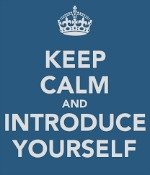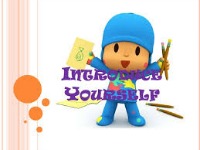 |
Learn English Locally, Apply It Worldwide! Enjoy Regular Practice |
Introducing Yourself
|
In this section we are going to briefly practise the matter of introducing yourself at a job interview. You already know that first impressions play a vital role in how an employer perceives you as a candidate for the job and you really want that job. Keep your confidence high, keep calm and ... you are... |
 |
Both what you say and what you do during the first phase of the interview (and... sometimes what you do NOT do) will have a lot of influence on the employer's decision - in a good way or in a bad way.
You will actually have to introduce yourself twice, since you will normally arrive at the reception desk first. Here you will have to state your name and the purpose of your visit. A standard example is: "Hello./Good morning./Good afternoon. My name is Cindy Kort and I have an interview scheduled with Sarah White at 4pm.". You need to be pleasant and it is very important to not lose your smile at this point, in spite of feeling overwhelmed with fear, doubt or any other kind of apprehension.
They will show you the way to the interview room, or perhaps the hiring manager will come to meet you in the reception area. On meeting him/her take your time to introduce yourself again, maintaining your sincere smile, and without assuming that "it's OK, they know who you are anyway..."
Job interview scenarios
We shall soon look into types of questions for this purpose, but for those of you who know the difference between a closed and an open question (a closed Q is a yes/no kind of question, the rest being open questions), imagine you will be faced with an open-ended question for a start. Usually it goes like "Tell me about yourself." and ... "Why should we hire you?"
To answer this correctly you will need to be very selective and present the key elements in your background which could demonstrate why you are the best candidate for the job. For you to do this correctly, you need to have done your homework of analysing the job carefully in advance.
What to say and how to do it right?
Your introduction needs to be concise and captivating enough, for you to hold the interest of the interviewer. Generally, you will mention the most persuasive qualifications and the most relevant experience you can bring to the table once employed. This will usually suffice, since they also have your complete C.V.
Extra points you could mention are details that may not be essential for the interview, but will reflect the kind of person you are. For example if you love playing team sports, or play an instrument in a band you're a team person, but if you like reading and watching movies you're the solitary kind. The secret is to be aware of what the employer is looking for.
Your ultimate goal during the interview is to connect with the interviewer at a personal level AS WELL AS to prove that you are qualified for the job and feel good about joining the company.
 |
However much enthusiasm you can show for the job and organisation, try to maintain yourself composed and NOT overdo it. Also, don't spend too much time talking about yourself - leave some time for a discussion about the job, the salary and any other questions you may have to ask the assessor. |
In our next lesson we shall consider how to prepare your introduction, including some follow up questions, which your interviewer will probably use to guide you to support whatever assertions you make during the introduction. Be prepared to offer specific examples of how and when you were successful in using your skills to carry out paid work or a volunteering project. Academic projects as well as other productive endeavours enter in this category.
English Corner Weekly E-zine
Packed with knowledge, published on Tuesdays.
Get yours here!
Our Archives:
Our lessons in the names and sounds of letters, short & long vowel sounds, CVCs, CCVCs, CVCCs, sight words, vowel and consonant contrasts, etc.
Our lessons will help increase your vocabulary, word recognition, find meaning in context, skills for TOEFL tests and other games, for fun.
Here we shall build some lessons to help you improve your writing skills.
Lots of lessons: cause & effect, comparisons, linking signals, relative clauses, presenting information, expressing emotions and grammar games, of course. We had more lessons on: intensifying adverbs and phrasal verbs, expressing various concepts such as addition, exception, restriction and ambiguity. Lately we started some exercises: likes/dislikes, frequency adverbs (twice), verb tenses, etc.
Learn how to build a website, by using the SBI! system - start from the basics, developing a site concept and a niche, supply and demand, learn about profitability and monetization, payment processing, register domain, website structure and content as a pyramid. Also learn about the tools I'm using to build this website. We also covered how to build traffic, working with search engines, building a good system of inbound links, using social marketing and blogs with the SBI system, how to use Socialize It and Form Build It, how to publish an e-zine and how to build a social network in your niche.
We looked at a few games by now: Countable & uncountable nouns, Free Rice, Name That Thing, Spell It, Spelloween, the Phrasal Verbs Game, Preposition Desert, The Sentence Game, Word Confusion, Word Wangling, Buzzing Bees, and The Verb Viper Game.
Be prepared to play and learn more pretty soon.
